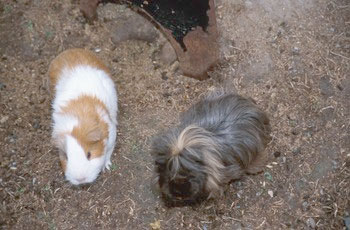The scientists say that they try to use alternatives to animals where possible

Over 500 UK scientists and doctors have signed a petition supporting animal testing in medical research. They signed a statement that a small but essential proportion of medical research involves animal experiments. The announcement, drafted by the Research Defense Society (RDS), disappointed groups claiming concern for animal welfare. On Tuesday, a farm in Staffordshire breeding guinea pigs for medical research said it would stop after threats from animal rights activists.
death threat
Another family-owned farm that announced the cessation of operations is the Darley Oaks farm in Newchurch, where the voles grown there are used to develop treatments for respiratory problems, such as asthma. The owners and workers were the target of threats, and some of them also received death threats during a six-year campaign. Wednesday's statement, unrelated to the Darley Oaks farm decision, was issued 15 years after a similar statement was issued by the British Association for the Advancement of Science.
The protesters claim that the statement did not include reference to the pain and sorrow caused by animal experiments. Among the signatories of the scientific petition are three Nobel Prize winners, 190 fellows of the Royal Society and the Medical Research College, as well as 250 university professors. Dr. Simon Festing, CEO of RDS says: "We are pleased that we have collected over 500 signatures from leading scientists, academics and doctors in less than a month. This shows the strength and depth of support for humane animal research in this country.
Looking for alternatives
In a statement, the scientists write that researchers should preserve the medicine and the scientific benefits that animal experiments can provide. However, it also points to the need for many scientists to make every effort to ensure the welfare of animals and minimize suffering. Wherever possible, the petition states, animal experiments must be replaced by methods that do not use them, and that the number of animals participating in experiments must decrease.
The concept of replacement, improvement and reduction form the backbone of the British government's policy regarding animal experiments. All signatories also undertake to comply with this policy. "We will try not to use animals and will make efforts to look for alternatives," said geneticist Robin Lovell-Badge from the National Institute for Medical Research in London. "However, without these studies there would have been no progress in finding treatments to relieve pain, suffering and diseases in animals as well as in humans" he added.
No progress
In the announcement, the scientists also promise to be more open about the experiments, and to make sure that the researchers provide clear information and promote rational discussions. Indeed, according to Dr. Festing, in the last two years there has been a greater openness among scientists. The RDS statement does not mention the pain, damage and stress to which the animals participating in the experiment are subjected.
The Walla News website adds that Darley Oaks Farm's announcement was met with applause among animal activists, but the British Ministry of Trade and Industry reacted firmly and condemned the behavior of the protesters. "It is completely unacceptable that a small minority of extremist animal activists will embark on a campaign of fear and threats in an effort to prevent individuals and companies from engaging in legal and legitimate work," said the ministry's spokesperson.
The opposition also agreed with the government's position. The conservative representative whose farm is in his constituency described the protesters as "animal rights terrorists" and said that "it is a sad day when we see, even if mistakenly, that terrorist tactics have succeeded and the rule of law in our country has failed." The spokesman for the Liberal Democratic Party, Evan Harris, also called the news "a victory for terrorism and extremism."
"Continue until they close, then move to another place"
In the British research community, they expressed serious concern about the consequences of the new development. "This will make the UK a place where relevant clinical research cannot be carried out," warned Roger Morris, a leading researcher at King's College London. He added that "when we talk to colleagues in Europe and America, Britain is perceived as a place where animal experiments cannot be carried out". However, he added that the situation has not yet reached the point where it is affecting efforts to recruit young researchers.
Simon Festing, of the British Research Foundation, said that research on ants - the animal raised at Darley Oaks Farm - had led to 23 Nobel Prizes for medicine. "It is horrifying that a small group of extreme criminals can bring about the closure of a legitimate business that supplies animals for medical research."
A spokesman for the organization "Save the Newchurch Vultures", who agreed to be identified only as "Johnny", said "This is the most wonderful day of my life. This is a victory for the animals and it is a fundamental victory for the animal rights movement. I am unbelievably proud to be a part of the movement. It brings tears. These vultures will not have to be locked up for one more day until the end of the year."
Johnny, who has been protesting peacefully in front of the farm for six years, said he believes it was a mixture of legal and illegal pressure that led to the decision. "Social theorists often call the legal and illegal protest a 'double whammy'. The lesson is to keep going until they close, then move to another place."
